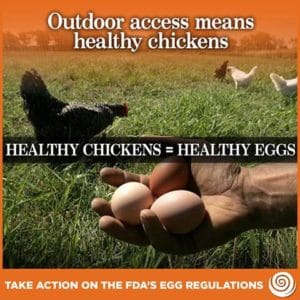 A major 2010 salmonella outbreak in eggs, centered on “factory farms” in Iowa, shone a spotlight on industrial-scale egg houses confining tens of thousands of hens, each, in filthy and dangerous conditions. This past July, the FDA issued a Draft Guidance for the prevention of salmonella enteritidis in shell eggs for egg producers providing outdoor access to their flock.
A major 2010 salmonella outbreak in eggs, centered on “factory farms” in Iowa, shone a spotlight on industrial-scale egg houses confining tens of thousands of hens, each, in filthy and dangerous conditions. This past July, the FDA issued a Draft Guidance for the prevention of salmonella enteritidis in shell eggs for egg producers providing outdoor access to their flock.
Despite scientific evidence tying higher rates of pathogenic contamination to older, massive factory farms with caged production/forced molting (banned in organics and now out of favor in conventional agriculture), the FDA is zeroing in on flocks with outdoor access (certified organic).
The new guidance will make it difficult, expensive and perhaps even impossible to have medium-sized flocks of birds outside. This could spell the end, on a commercial scale, of truly organic eggs where hens are outdoors exhibiting their native behavior, as required by USDA’s organic regulations.
There is a critical need for the good food community to come together right now. Please sign and mail back Cornucopia’s proxy-letter (today!) on egg safety and other food safety issues (the proxy letter also addresses the threat posed by the FDA’s proposed food safety Rule for diverse produce farmers).
The FDA’s new food safety rules have the real potential to force some of the safest local and organic farms out of business!
The FDA, in its draft guidance on eggs, appears to have colluded with a willing USDA to determine that an enclosed tiny porch, attached to the poultry house and permitting only a minute portion of the flock to access at any one time, constitutes acceptable outdoor access. The FDA must delete the “Indoor Area with Porch” as one of the four housing styles acceptable for organic production and make their guidance for outdoor pasture area “chicken and farmer friendly.”
Rather than placing unnecessary and expensive regulatory burdens on producers with outdoor access, the FDA should focus its efforts on addressing the significant risk factors of cages and large flocks. Multiple scientific studies, in addition to experience/data from European countries, conclude that the risk of salmonella contamination is significantly greater when hens are kept indoors in cages.
Many of the guidance’s recommendations for avoiding contact with wild birds, and other wildlife, are logistically and economically impractical, and risk putting undue burdens on organic producers who follow the spirit and the letter of the organic law and regulations, which require meaningful outdoor access for all birds.
- Netting the entire outdoor run would be cost-prohibitive and impractical.
- Noise cannons would presumably scare the hens as well as wild birds, and hens would be discouraged from going outdoors (there is no research presented by the FDA to suggest otherwise).
The FDA was highly selective in the scientific studies that are cited to support its conclusion that contact with wild birds should be minimized. The FDA cited only four studies to justify targeting contact with wild birds (of these four studies, one deals with broilers, not layers). And the agency ignored studies from Europe that have shown great success in controlling salmonella without requiring netting, noise cannons or other measures to limit contact with wild birds.
For further in-depth analysis of the relative risks associated with conventional, confinement egg production, and eggs from certified organic farms, with access to the outdoors, please refer to a scientific literature review conducted in 2011 by The Cornucopia Institute and our formal comments submitted to the FDA on its draft guidance document.
Please act today by printing, signing and mailing your proxy letter!

